

Moving Beyond the Search-and-Destroy Instruction Session in a Community College Library In my past life when I was an adjunct English teacher, one of my most dreaded semesterly duties was to take my class to the library for instruction.
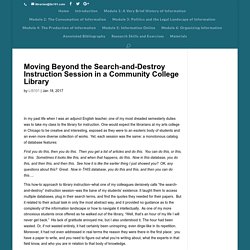
One would expect the librarians at my arts college in Chicago to be creative and interesting, exposed as they were to an esoteric body of students and an even more diverse collection of works. Who gets free speech in the university classroom? Higher education news has been awash in recent months with the comments by the University of Oxford’s Vice Chancellor Louise Richardson: “I’ve had many conversations with students who say they don’t feel comfortable because their professor has expressed views against homosexuality.
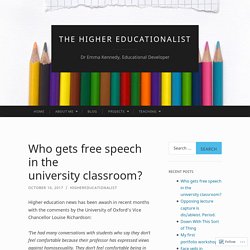
They don’t feel comfortable being in class with someone with those views. “And I say, ‘I’m sorry, but my job isn’t to make you feel comfortable. Education is not about being comfortable. Playing devil’s advocate in conversations about race is dangerous and counterproductive. Drew Angerer/Getty Images I’ve been asked to consider the devil’s point of view so often over the course of my life that I’m beginning to feel like I know him.

When having conversations about race with a white person, there are no five words I have come to dread more than, “Just to play devil’s advocate … ”—they’ve unseated “not to sound racist, but … ”—a feat I heretofore thought was impossible. A few years ago, following a panel presentation I had made at a conference, I was approached by an audience member. The man had waited in line for 10 minutes so he could tell me that his son had been denied admission to my law school alma mater because, unlike me, he was white and so couldn’t benefit from affirmative action.
I recounted this infuriating story to a white friend of mine recently after it was reported that the Trump administration would begin targeting universities that use affirmative action policies for possible legal action. How to Live to the Full While Dying: The Extraordinary Diary of Alice James, William and Henry James’s Brilliant Sister. So, about this Googler’s manifesto. – Yonatan Zunger – Medium.
So it seems that someone has seen fit to publish an internal manifesto about gender and our “ideological echo chamber.”
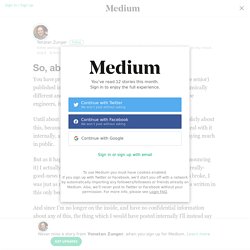
The Pencilsword: On a plate. But, Andrew Adonis, I don’t want to work hard. Over on Twitter, if you move in academic circles, you’ll almost certainly have seen a whole load of controversy over some tweets that Andrew Adonis (the former Labour politician) sent out about the state of Higher Education.
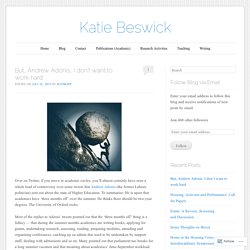
To summarise: He is upset that academics have ‘three months off’ over the summer. He thinks there should be two-year degrees. The University of Oxford rocks. The good daughter. In Tate Britain is a painting by the Victorian artist George Elgar Hicks of a woman ministering tenderly to her invalid father.

It is called Comfort of Old Age. The work is the final panel of Hicks’s triptych Woman’s Mission. The first part, Guide of Childhood, in which the same figure teaches her little boy to walk, has been lost. Ten Myths and a Truth from the TEF: Reading the White Paper. Although the Higher Education and Research Bill is still going through parliamentary scrutiny, the Teaching Excellence Framework is about to be implemented and yet we do not know for certain what its effects will be, or even which institutions will enter into it.
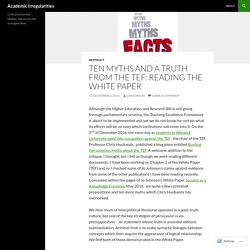
On the 2nd of December 2016, the same day as students at Warwick University went into occupation against the TEF , the chair of the TEF, Professor Chris Husbands, published a blog piece entitled Busting five common myths about the TEF. A welcome addition to the critique, I thought, but I felt as though we were reading different documents. I have been working on Chapter 2 of the White Paper (TEF) and so I checked some of Jo Johnson’s claims against evidence from some of the other publications I have been reading recently. Concealed within the pages of Jo Johnson’s White Paper, Success as a Knowledge Economy, May 2016, are quite a few contested propositions and ten more myths which Chris Husbands has overlooked. Librarians in the 21st Century: It Is Becoming Impossible to Remain Neutral. Library neutrality sounds innocuous, but it’s not, if you’re a librarian.
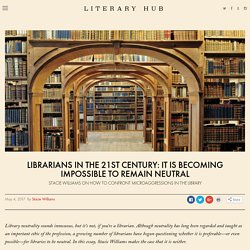
Although neutrality has long been regarded and taught as an important ethic of the profession, a growing number of librarians have begun questioning whether it is preferable—or even possible—for libraries to be neutral. In this essay, Stacie Williams makes the case that it is neither. –Stephanie Anderson I love working the reference desk. Like most people, it was my first introduction to librarians as a little kid: the smiling person behind a desk, asking me if I needed help finding anything. Working in such a visible position, over the years, I have been constantly reminded that my interactions with patrons are a reflection of my body: my black, female-presenting body.
Stop Apologizing for the Delayed Response in Your Emails. “Adulthood is emailing ‘sorry for the delayed response!’
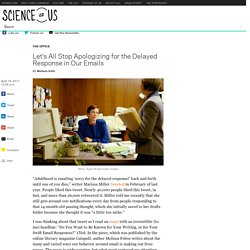
Back and forth until one of you dies,” writer Marissa Miller tweeted in February of last year. People liked this tweet. "What have they done to my library?" - Caitlin Moran's latest column. This Saturday’s Times featured a fantastic column from Caitlin Moran on the importance of libraries – not the first time she has written on the subject.
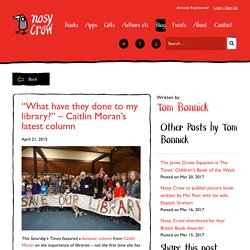
On the Milo Bus With the Lost Boys of America’s New Right. 4chan: The Skeleton Key to the Rise of Trump – Dale Beran – Medium. Trump’s younger supporters know he’s an incompetent joke; in fact, that’s why they support him. 1. Born from Something Awful Around 2005 or so a strange link started showing up in my old webcomic’s referral logs. Letter from a Birmingham Jail [King, Jr.] 16 April 1963 My Dear Fellow Clergymen: While confined here in the Birmingham city jail, I came across your recent statement calling my present activities "unwise and untimely.
" In Venezuela, we couldn’t stop Chávez. Don’t make the same mistakes we did. Hugo Chavez was a populist, too. His opponents never figured out how to beat him. (AP Photo/Jorge Santo) Donald Trump is an avowed capitalist; Hugo Chávez was a socialist with communist dreams. The Immigration Ban is a Headfake, and We’re Falling For It.
Assuming this narrative is true (again, I have no idea what the administration intends), the “resistance” is playing right into Trump’s playbook. The most vocal politicians could be seen at rallies, close to the headlines. The protests themselves did exactly what they were intended to: dominate the news cycle and channel opposition anger towards a relatively insignificant piece of the puzzle. I’m not saying that green card holders should be stuck in airports — far from it. » Blacklists are technically infeasible, practically unreliable and unethical. Period. It’s been a big weekend for poorly designed blacklists. But prior to this another blacklist was also a significant discussion.
Beall’s list of so-called “Predatory” journals and publishers vanished from the web around a week ago. There is still not explanation for why, but the most obvious candidate is that legal action, threatened or real, was the cause of it being removed. Since it disappeared many listservs and groups have been asking what should be done? My answer is pretty simple. Here are 23 terrifying things that President Trump has done in the last seven days. Donald Trump was inaugurated on Friday 20 January. All I Know Is What’s on the Internet — Real Life. Once a fearsome murderer invaded a Zen master’s home. Sherlock And The Adventure Of The Declining Standards.
Contains a memory palace full of spoilers. Scientists aren't superheroes – failure is a valid result. Concern has been growing in the past decade about published scientific claims that other laboratories can’t successfully replicate. Post-truth and information literacy. V for Volunteer – a dystopian reality. Four months ago I conducted an interview with the chair of a trustee group who are responsible for the museum in their small city.
Parents Of Nasal Learners Demand Odor-Based Curriculum. COLUMBUS, OH–Backed by olfactory-education experts, parents of nasal learners are demanding that U.S. public schools provide odor-based curricula for their academically struggling children. Teaching ‘grit’ is bad for children, and bad for democracy. According to the grit narrative, children in the United States are lazy, entitled and unprepared to compete in the global economy. Schools have contributed to the problem by neglecting socio-emotional skills. The solution, then, is for schools to impart the dispositions that enable American children to succeed in college and careers. According to this story, politicians, policymakers, corporate executives and parents agree that kids need more grit. The person who has arguably done more than anyone else to elevate the concept of grit in academic and popular conversations is Angela Duckworth, professor at the Positive Psychology Center at the University of Pennsylvania.
You Don’t Know Your Students. This Professor Hopes to Change That. - The Chronicle of Higher Education. This is the latest episode of our new podcast series on the future of higher education. You can subscribe in iTunes, to get past and future episodes. It’s near midnight on a Friday at Kansas State University, and an associate professor of anthropology is out with his students, sneaking onto the rooftop of a campus building — or at least trying to. You Don’t Know Your Students. This Professor Hopes to Change That. - The Chronicle of Higher Education. Not Enough Voices - Hybrid Pedagogy. We Can Handle the Truth. I’ve Got a Serious Problem with “Serious Academics.” – The Tattooed Professor. Trying to make it in the non academic world…
I’m With The Banned — Welcome to the Scream Room. Paulo Freire, critical pedagogy, and libraries. Katyboo1's Weblog. Would Europeans be free to stay in the UK after Brexit? The digital skills crisis - infoism. Libraries, books, and librarians. Who is the woman in the first world problems meme image? - Quora. Technigal. Accessing Publisher Resources via a Mobile Device: A User’s Journey.
What’s the point of education if Google can tell us anything? Welcome to 'the worst job in the world' – my life as a Guardian moderator. Poor writing advice. Meditation for Beginners: 20 Practical Tips for Understanding the Mind. Quote by Umberto Eco: “Books are not made to be believed, but to be su...” Beyond the Bullet Points: Bad Libraries Build Collections, Good Libraries Build Services, Great Libraries Build Communities.
The Materiality of Research: ‘On the Materiality of Writing in Academia or Remembering Where I Put My Thoughts’ by Ninna Meier. Critiquing Scholarly Positions. 24 books you've probably never heard of that will change your life. Librarians Find Themselves Caught Between Journal Pirates and Publishers. How to Use a Bullet Journal to Stay Organized! — Plant Based Bride. Researcher illegally shares millions of science papers free online to spread knowledge. Q: What did universities learn from the financial crash? A: Nothing. Information literacy is for life, not just for a good degree. The Answers, The Questions and Practical Significance — Identity, Education and Power. Concrete ways faculty can work with other colleagues to improve their teaching (essay)
Just because you can’t see it, doesn’t mean it’s not real. In the library in the gym, Big Brother is coming to universities. There's something better than a 'fuck off fund'